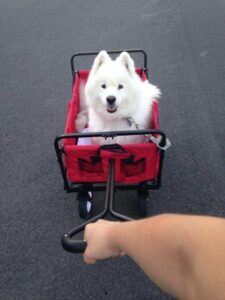-
Adopt
-
Veterinary Care
Services
Client Information
- What to Expect – Angell Boston
- Client Rights and Responsibilities
- Payments / Financial Assistance
- Pharmacy
- Client Policies
- Our Doctors
- Grief Support / Counseling
- Directions and Parking
- Helpful “How-to” Pet Care
Online Payments
Referrals
- Referral Forms/Contact
- Direct Connect
- Referring Veterinarian Portal
- Clinical Articles
- Partners in Care Newsletter
CE, Internships & Alumni Info
CE Seminar Schedule
Emergency: Boston
Emergency: Waltham
Poison Control Hotline
-
Programs & Resources
- Careers
-
Donate Now
TPLO (Tibial Plateau Leveling Osteotomy) is a popular orthopedic surgery performed on dogs that have torn a ligament in their knee, similar to the ACL in humans. Post-TPLO care is best discussed with your pet’s surgeon. However, here is a list of 8 helpful tips to get you and your pet started on the road to recovery:
1. Use a friend. Depending on the size and energy level of your dog, it might be hard for just one person to pick your pet up from the hospital and transport her home. Bringing a friend along ensures that your pet will stay safe in the back of your car.
2. If you can, take time off from work. If this isn’t an option, find someone you trust who is willing to supervise your dog for at least a week while you are at work.
3. Make arrangements for other animals in the house. Only you know your animals – if your other pets are calm, you may not need to change anything! After surgery, it’s important to keep your dog quiet and stress-free. If other animals in the house would distract her or cause mischief, see if you can keep them separate either by finding a sitter or confining them to a different side of the house.
4. Find an enclosed place, just for her. Your dog will need to be in a confined area where they are not tempted to climb, jump, or pull on things. For some, a crate is useful, for others, blocking off a room with a baby gate works. Talk to your vet about an appropriate-sized enclosure that will keep your dog safe by limiting mobility but still allow you to keep her company.
5. Cold packs. After surgery, you’ll need to ice the leg to reduce swelling. Flexible cold packs are comfortable and easy to use.
6. How does she like to pass the time? Time for chew toys! From Kongs to bones to puzzles, it’s important to keep their brain (and mouth) busy!
7. Ask your vet. Everyone’s dog is different. If something doesn’t seem right, ask your vet.
8. Additional support. Your dog may need additional support walking when she arrives home. Visit www.angell.org/sling to find out how to easily construct your own sling to help her get around.
